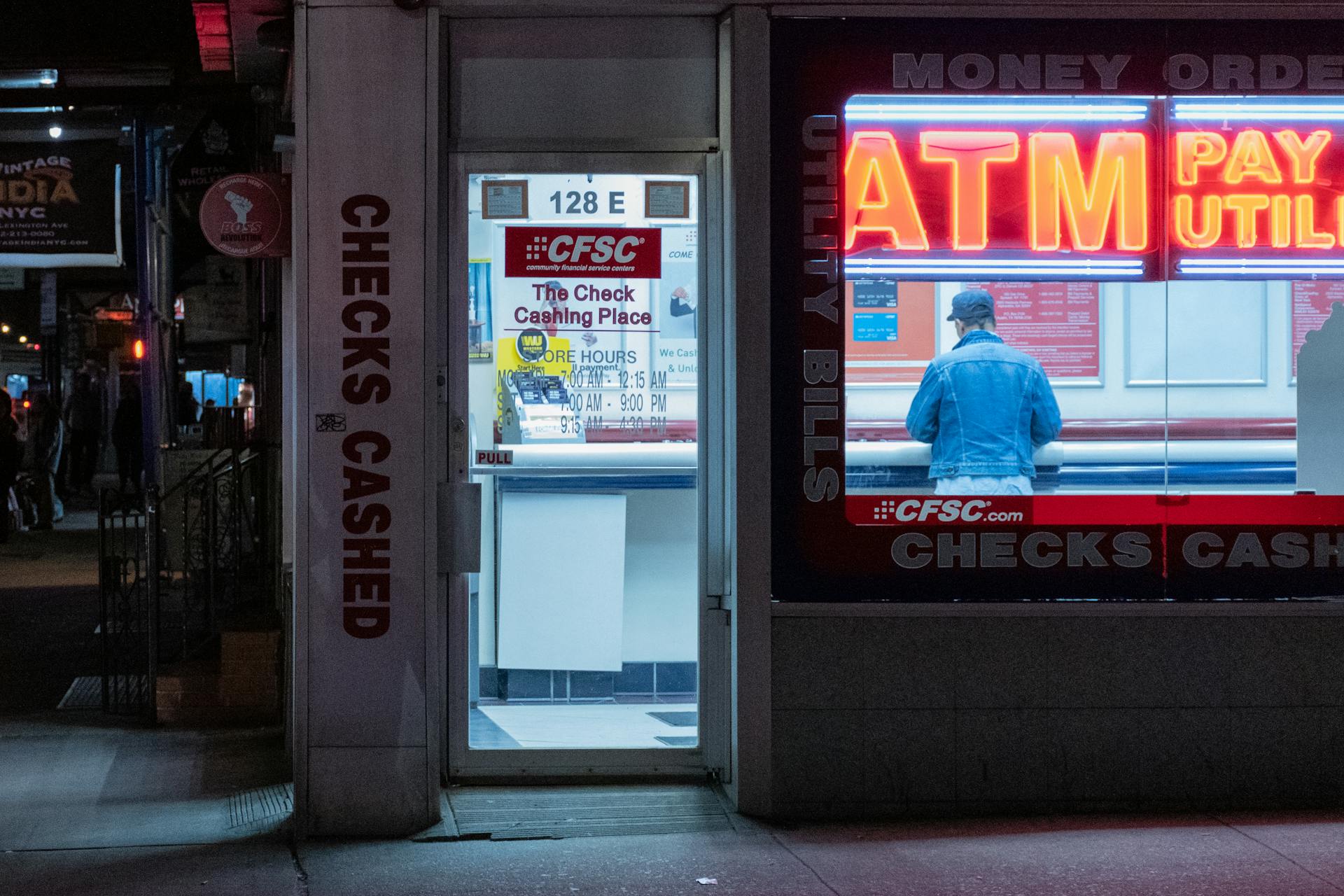
Business checks and personal checks may seem like interchangeable terms, but they serve distinct purposes and have varying features. Business checks are designed for commercial use and typically have a higher security standard than personal checks.
The main difference between business and personal checks lies in their security features. Business checks often have watermarks, security threads, and other advanced security measures to prevent counterfeiting.
Business checks usually require a business account to purchase, and the bank may have specific requirements for ordering checks. This can include providing a business license, tax ID number, or other documentation.
Personal checks, on the other hand, are designed for individual use and often have fewer security features.
You might enjoy: How Often Do You Get Bank Statements
What are Business Checks?
Business checks are a traditional payment method used by businesses to cover expenses. They are linked to business checking accounts and can be used to pay employees, vendors, or other business-related expenses.
To use a business check, you'd simply make the check out to the payee, fill in the required information, including the date and amount of the check, and sign it. Business checks typically have a memo line where you can record what the check is being used for.
See what others are reading: Ally Bank Used to Be
Business checks are commonly used by businesses of all sizes, but they can also use other payment methods like credit cards and business-to-business ACH payments to pay expenses. These modern options may offer more security and lower fraud risk than traditional business checks.
Business checks can take two days to clear, or for the funds to become available, when deposited by the payee. This is because the bank needs time to verify the check and transfer the funds from the business checking account.
A business check is associated with a business checking account, which holds the company's money instead of the owner's personal money. This is a key difference between business checks and personal checks.
Curious to learn more? Check out: One - Mobile Banking
Benefits and Features
Writing business checks can add credibility to your venture, making it look more professional.
Having a separate business checking account can also make it easier to get approved for business loans or lines of credit if you have a good banking history.
Using separate business and personal checking accounts provides an added protection against creditor lawsuits, which is especially important if you're self-employed or have a business with a complex structure.
Money in a personal checking account may be safe from collection efforts if you're sued by a creditor, but this depends on how your business is structured.
Simplified Tax Reporting
Having a separate business checking account can save you a lot of time and stress when it's time to file your taxes. You'll be able to easily separate business and personal transactions, making it a breeze to find deductible expenses.
A separate business checking account also provides a clear paper trail of business spending, which can be a lifesaver if you're ever audited.
Explore further: Online Real Time Bill Payment
Benefits of Separate Accounts
Having separate business and personal checking accounts can provide an added protection against creditor lawsuits. This is because money in a personal checking account may be safe from collection efforts if you're sued by a creditor.
See what others are reading: I M B Bank Share Price Today
Writing checks with your business name can add credibility to your venture, since it looks more professional.
Establishing a separate business checking account can make it easier to get approved for business loans or lines of credit if you have a good banking history.
Having a separate business checking account can simplify tax reporting by providing a clear paper trail of business spending. This can save you time and stress when it's time to file your taxes.
You may consider opening a business checking account if you're interested in any of the following: maintaining a separate checking account for your business, writing checks with your business name, or getting approved for business loans or lines of credit.
Readers also liked: Real Time Credit Payment
Choosing and Using
Business checks and personal checks have some key differences, but they also share some similarities. Business checks are given to businesses when they open a business bank account, and they usually come with a checkbook and check register.
You can use a business check by making it out to the payee, filling in the required information, and signing it. The payee can then deposit the check, and it typically takes two days to clear.
Business checks have a memo line where you can record what the check is being used for, which can be helpful for tracking expenses.
A unique perspective: What Is Payee Account Number
Choosing an Account
To start, you'll need to consider how you want to open your business checking account. Some banks allow you to open an account online, while others require you to do so in person.
Account opening requirements can vary, so it's a good idea to check with the bank ahead of time to see what documentation you'll need to verify your business status.
You'll also want to think about the minimum deposit requirements for the account. Some banks may require you to open your account with a specific amount of money, then maintain a certain minimum balance going forward.
You might like: Bank Reserve Requirements 2024

Fees are another important consideration when choosing a business checking account. Look for banks that offer low or no fees for maintenance, overdrafts, and other services.
Being able to access your account online and through mobile banking is crucial for many business owners. Look for banks that offer user-friendly online and mobile banking platforms.
Transaction limits can also vary between banks, so be sure to check the limits on deposits, withdrawals, and purchases before opening an account.
Finally, consider any added features or benefits that the bank may offer, such as merchant services, fee waivers for business credit cards, or interest on your business checking balance.
Discover more: Cash Limits on Bank Deposits
Size of the
Personal checks are usually around 6″ x 2″ x 3″ in size.
Business checks can be larger, often measuring 8″ x 2″ x 3″, which provides more room for writing out checks by hand.
The size of checks can make a difference in how easy they are to print and use.
Here's an interesting read: Pci Dss Level 2
Differences and Comparison
Business checks and personal checks may seem similar, but they have some key differences. Business checks can come with features like debit cards for employees, merchant services, and payroll processing services that personal checks don't.
Business checking accounts can also differ from personal checking accounts in terms of account opening, minimum deposit requirements, and fees. For example, to open a business account, you may need to provide proof of business ownership, such as a copy of your articles of incorporation or business license.
Business checks are designed for business use, but they can also be useful for individuals who don't have access to direct deposits or want to make large payments. In contrast, personal checks are typically used for everyday expenses and may not have the same level of security features as business checks.
To help you decide which type of check is right for you, here's a comparison of the two:
Business checking accounts may require a higher minimum deposit or balance to avoid fees, whereas personal checking accounts may have lower or no minimum requirements.
What's the Difference

Business and personal checking accounts have some key differences, which are worth understanding if you're a business owner or just starting to separate your finances.
A business checking account can come with features that a personal checking account doesn't, such as debit cards for employees, merchant services for processing card payments, and bookkeeping integrations.
Business checking accounts may require a higher minimum deposit to open, such as $500 or $1,000, compared to personal checking accounts that can be opened with as little as $1. You may also be required to maintain a higher minimum balance in your account to avoid a monthly maintenance fee.
Business checking accounts can be useful for separating personal and business finances, which can help you stay on budget and avoid overspending on both personal and business expenses.
Business owners should not pay business expenses with personal checks, as it can blur the lines between personal and business finances and make tax season a headache.
See what others are reading: Basel 1 vs Basel 2

Business checking accounts can offer limited liability protection to business owners, which can protect their personal assets in case the business is sued or they default on a debt.
Here are some key differences between business and personal checking accounts:
Business checking accounts can be a useful tool for business owners, but it's essential to understand the differences between them and personal checking accounts to make informed decisions about your finances.
FDIC Insurance
FDIC Insurance is a crucial aspect to consider when opening a business checking account. The FDIC offers protection for personal deposit accounts, including business accounts.
Business checking accounts are covered under FDIC insurance, which means your money is protected up to $250,000 per depositor, per insured bank for each account ownership type. This protection extends to various types of business accounts, including checking accounts, negotiable order of withdrawal (NOW) accounts, savings accounts, and more.
Some examples of business accounts that are covered by FDIC insurance include:
- Checking accounts
- Negotiable Order of Withdrawal (NOW) accounts
- Savings accounts
- Money market deposit accounts
- Time deposits, such as certificates of deposit (CDs)
- Cashier’s checks, money orders and other official items issued by a bank
FDIC insurance does not cover investment accounts, safe deposit boxes, life insurance policies, or annuities.
Cashier's vs. Checks
Cashier's checks and personal checks may seem similar, but they're actually quite different. Cashier's checks are guaranteed by the bank, making them a more secure form of payment.
One key difference is that cashier's checks are drawn from the bank's own funds, whereas personal checks are drawn from the account holder's funds. This means that cashier's checks are less likely to bounce.
Cashier's checks typically require the buyer to sign the back of the check, whereas personal checks often require the account holder's signature on the front. This can be a minor inconvenience, but it's an important step in verifying the payment.
In general, cashier's checks are considered more trustworthy than personal checks, especially when dealing with large transactions. This is because cashier's checks are less likely to be disputed or rejected.
See what others are reading: Cash App Mobile Check Deposit Funds Availability
Fees and Timing
Cashier's checks require upfront payment, whereas personal checks don't affect your balance until they're deposited and clear.
Issuing a cashier's check can come with fees, typically around $10 or $15, depending on your bank and account type.
Personal checks, on the other hand, usually come with a free checkbook when you open an account, but you might need to buy more checks or pay a fee if they bounce.
Curious to learn more? Check out: E S a Payments
Fees
Fees can be a significant aspect of using checks. Bank fees for issuing a cashier's check can range from $10 to $15.
Typically, personal checking accounts come with a free checkbook when you open an account. However, if you need more checks, your bank might charge a fee.
Bouncing a check can be costly, with a fee of around $30 for the payor. The recipient trying to cash the check may also have to pay a fee.
Some banks offer starter checks for free when you open a new checking account, but this benefit may not be included with business checking accounts.
Hold Periods
Hold periods can vary depending on the type of check you deposit.
Funds from a cashier's check are usually available the next business day after deposit.
Personal checks, on the other hand, can have longer hold periods.
Some banks have hold periods of up to seven business days for personal checks, allowing them to verify sufficient funds.
This means you might not have access to the money from a personal check right away.
Readers also liked: Are Money Orders Certified Funds
Expiry
Expiry is an important consideration when it comes to checks. Cashier's checks don't necessarily have an expiration date unless specified.
If you're dealing with personal checks, you'll want to cash or deposit them within 180 days to avoid invalidation. This timeframe can sneak up on you, so be sure to keep track of when you received the check.
In my experience, it's surprising how many people forget about this deadline, only to find their check is no longer valid.
Payment Timing
Payment Timing is a crucial aspect to consider when it comes to managing your finances.
Cashier's checks are paid for upfront, meaning your account balance drops immediately after purchase.
You can't use a cashier's check to spend more money because the funds are already deducted from your account.
Personal checks, on the other hand, don't affect your account balance until the recipient deposits or cashes them.
If you had $1,000 in your checking account and bought a $500 cashier's check, your balance would immediately drop to $500.
With a personal check, your balance would sit at $1,000 until the recipient deposits or cashes the check.
Broaden your view: Pay T Mobile by Apple Pay Cash Back
When to Use
You may be able to use personal checks for business expenses, but it's generally not recommended. Mixing personal and business finances can cause accounting issues and complicate your taxes.
Using business checks for business purposes can help you separate your expenses and make sense of your financial health.
Recommended read: Can I Write off Business Expenses on My Personal Taxes
Protecting Assets
Keeping personal assets separate from business assets can offer a significant advantage in case your business is sued or you default on a debt. This is because business checking accounts can offer limited liability protection to business owners, as stated by the Small Business Administration.
Using a business checking account can help safeguard your personal assets by separating them from your business assets.
Enrolling in merchant services can also provide purchase protections to your customers and keep their personal information secure, making it a worthwhile investment for any business.
Expand your knowledge: Amazon Usbank Offer
When to Use a Cashier's
You'll usually need to use a cashier's check when you're paying someone who requires the funds are guaranteed, such as for your first month's rent on an apartment.
Paying for a large purchase, like buying a car or piece of land, often requires a cashier's check.
Using a cashier's check can give the recipient peace of mind, knowing the funds are secure and guaranteed.
You might enjoy: Paying Business Taxes on Bankrupt Business
Transaction Eligibility

You can use personal checks to pay for business expenses, but it's not recommended. This can cause accounting issues and complicate your taxes.
If you do decide to use personal checks for business expenses, you can write out a personal check to pay a business lease or make payments to a business loan. However, many personal checking account agreements specifically prohibit using this kind of account for business purposes.
You should familiarize yourself with your account guidelines to avoid any potential issues. It's also a good idea to consult a tax adviser about your unique financial situation.
Using business checks for business purposes can help you separate your expenses and make sense of your financial health. This is especially important for small business owners who need to keep track of their cash flow.
Mixing personal and business finances can be hard to untangle, especially when it's time to pay your taxes and figure out personal vs. business deductions.
Suggestion: Can I Use Venmo for My Business
Frequently Asked Questions
Can I use personal style checks for business?
No, it's best to use business checks for business transactions to keep finances separate. Business and personal checks have different features tailored to their purposes
Can I use regular checks for a business account?
While it's technically possible to use personal checks for a business account, it's generally recommended to keep business and personal finances separate for better organization and accounting. Consider opening a dedicated business checking account for easier financial management.
Sources
- https://www.forbes.com/advisor/banking/checking/business-checking-vs-personal-checking/
- https://www.sofi.com/learn/content/business-checks-vs-personal-checks/
- https://erika.com/cashiers-check-vs-personal-check/
- https://relayfi.com/blog/business-checks-vs-personal-checks
- https://www.techtimes.com/articles/280128/20220905/tech-checks-difference-between-business-and-personal-checks.htm
Featured Images: pexels.com


